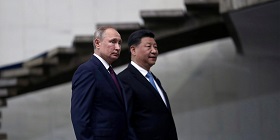The perpetual topic of Russia-Europe relations was one of the central themes at the recently concluded annual Munich Security Conference. It is no secret that these relations have, for a long time, been in a state of profound crisis. This was not only caused by the events in Ukraine, even though their significance and consequences for both Russia and Europe should by no means be understated. The roots are more profound, related to both parties being unprepared to develop optimal forms of their current interaction.
Nonetheless, speeches and discussions at the Conference showed signs that the involved parties are demonstrating a certain readiness to develop an optimal model for relations. In his opening speech, Germany’s President Frank-Walter Steinmeier clearly said, “Europe should not put up with the ever-greater alienation of Russia. We need other, better EU-Russia relations.” Most European leaders speaking at the Conference agreed, in one way or the other, with the notion that the current state of relations between Moscow and its western neighbours is unreasonable and needs to be revised. As always, it boils down to the matter of what specific, mutually acceptable parameters new relations could have.
The challenges Moscow and Brussels face today are not only tactical and situational, but also strategic and long-term, and the responses, therefore, should also be strategic and long-term.
Unless they want to continue repeating old mistakes, both historians and politicians should focus their attention on past experiences. What conclusions can we draw from the past 30 years of Russia-EU relations?
Our relations should be primarily based on pragmatic assessments of current opportunities and limitations, and not on emotions. As a result of diverging history, culture, religion, and lifestyle traditions, Russia and the European Union are not ready to create common spaces in the principal areas of their activity (apart from shared spaces, say, in the humanitarian, cultural, or educational areas). Swept by the euphoria induced by the end of the Cold War, we were clearly too hasty in declaring the prospect of creating a "Greater Europe." No matter how attractive this goal appears, we will not come close to implementing it soon.
In the current state, Russia and the European Union are tackling various development tasks that are sometimes far from being identical and can even contradict each other. This applies to politics, economy, and security. Any cooperation mechanisms will be workable only if they account for both shared interests and objectively existing diverging interests. This means that by "cooperation" we should imply combining common or coinciding interests, as well as minimizing expenses and costs stemming from inevitable rivalry and even elements of confrontation.
If this is the case, pragmatism should form the foundation of Russia-Europe relations. However, pragmatism alone is not sufficient for building stable relations. The "selective engagement" model claimed to build upon the pragmatic dialogue between Brussels and Moscow. However, the experience of the past six years demonstrated that bare pragmatism is barely different from opportunism and attempts to outmanoeuvre the partner somehow using one’s relative advantage in a particular area.
Therefore, the concept of “pragmatism" should be supplemented with the idea of "responsible interaction." Responsibility here entails primarily the parties’ ability and readiness to account both for their immediate situational interests and their long-term strategic interests. One does not need to be Nostradamus to arrive at the obvious conclusion that the further into the future we look, the more areas of coinciding Russian and European interests we see. We should not allow the sentiment and emotions of the current moment to block the view of long-term prospects.
Additionally, "responsibility" entails accounting not only for one's own interests, for also for those of one's partner, as well as the broader interests of the entire international system. Both the future of Russia-Europe bilateral relations and largely the future of the world order depend on Russia and Europe today. As we think of interaction in areas such as global and regional stability, nuclear non-proliferation, combating international terrorism, managing climate and migration flow, we need to always keep our collective responsibility for the emerging world order in mind. We simply do not have the right to think that “a game without rules” or a “war of all against all” is the historically inevitable new world order.
The perpetual topic of Russia-Europe relations was one of the central themes at the recently concluded annual Munich Security Conference. It is no secret that these relations have, for a long time, been in a state of profound crisis. This was not only caused by the events in Ukraine, even though their significance and consequences for both Russia and Europe should by no means be understated. The roots are more profound, related to both parties being unprepared to develop optimal forms of their current interaction.
Nonetheless, speeches and discussions at the Conference showed signs that the involved parties are demonstrating a certain readiness to develop an optimal model for relations. In his opening speech, Germany’s President Frank-Walter Steinmeier clearly said, “Europe should not put up with the ever-greater alienation of Russia. We need other, better EU-Russia relations.” Most European leaders speaking at the Conference agreed, in one way or the other, with the notion that the current state of relations between Moscow and its western neighbours is unreasonable and needs to be revised. As always, it boils down to the matter of what specific, mutually acceptable parameters new relations could have.
For nearly five decades, I happened to be directly involved in the practical issues of developing cooperation first between the USSR and Europe, and then between Russia and Europe. Over this lengthy historical period, the parties consecutively tested three interaction models, yet none of them ultimately withstood the test of time.
The first model, that of “controlled confrontation,” emerged during the Cold War when the USSR and Europe were divided by unsurmountable ideological, political, military and strategic barriers. Back then, the main task was to prevent a direct military engagement between the sides through reliance on the fundamental documents of the postwar world order. Where possible, the parties strove to resolve conflicts through dialogue and simultaneously build mutually advantageous cooperation. The Final Act of the 1975 Conference on Security in Europe and an entire package of treaties and agreements in arms control and confidence measures are among the starkest examples of such policy.
It should be said that, while being far from perfect, this policy made it possible to guarantee peace in Europe in the second half of the 20th century. In some way, back then, the situation in Europe was more stable and predictable than it is today. The rules of the game were acceptable for the opposite party, and dangerous "red lines" in the West and East were more evident than they are now.
The second model, that of a "Greater Europe," was tested after the fall of the Soviet Union and the consequent collapse of the entire socialist bloc and its institutions. The Charter of Paris for a New Europe signed in November 1990 by the heads of state and government of the OSCE declared that “the era of confrontation and division of Europe has ended" and a new era of democracy, peace and unity of Europe has started. The Charter for European Security signed in November 1999 in Istanbul was intended to “contribute to the formation of a common and indivisible security space” on the European continent. This document, as well as many others, signed by Russia, the European Union, NATO and other parties, was the foundation for establishing far-reaching plans to build a Greater Europe, a Common space stretching from Vladivostok to Lisbon and shared spaces in various cooperation areas, etc.
These developments transpired in front of our very eyes and, to our profound regret, never materialized. Today, after some time, we can objectively assess the steps of Russia and Europe after the Cold War to establish cooperation within the framework of a new reality. Without attempting to shift the blame on the other party, we can confidently say that the different interpretation of both the unfolding historical events and the future direction of the development of our relations constituted the key problem of our partnership.
Without focusing on the details, perhaps failures in implementing large-scale projects of building a new Europe stemmed from conceptual differences between Russia and Europe in their understanding of the fundamental principles of building such a European space, and not from craftiness and malicious intent (which also cannot be ruled out entirely). These differences became apparent and began to gain momentum as political agreements were being put into practice. Europe viewed the shaping of common spaces as the process of integrating Russia into the existing European bodies. At the same time, Russia saw it as the parties being equal participants in developing new mechanisms that accounted for new realities and the parties’ legitimate interests. Such irreconcilable stances were bound to turn into conflict sooner or later, which is precisely what happened.
The third relations model emerged after the acute stage of the 2014 Russia-West crisis. Subsequently, the European Union labelled it “selective engagement,” and this wording was included in Federica Mogherini’s “five guiding principles.” The idea was of Europe interacting with Russia where it suited Brussels interests, and opposing Russia where the interests of Moscow and Brussels diverged. On the whole, this concept was in line with Russian sentiment. It appeared that “selective engagement” would delineate mutually acceptable parameters of the “new normalcy” for a long time to come.
However, the new model appeared to have shown its deficiency as well, at least because the European Union still failed to form a united opinion on what degree of "engagement" in relations with Moscow was necessary. A new algorithm of interaction with Russia has never been elaborated in a single EU document. Additionally, the interests and capabilities of Moscow and Brussels are clearly asymmetrical; therefore, finding a mutually acceptable balance of interests in every specific area appears to be exceedingly difficult.
We believe, though, it to be far more critical that "selective engagement" essentially reduces the positive interaction between Brussels and Moscow exclusively to tactical, situational cooperation pertaining to current problems and specific, rigidly delineated areas. However, the challenges Moscow and Brussels face today are not only tactical and situational, but also strategic and long-term, and the responses, therefore, should also be strategic and long-term.
Unless they want to continue repeating old mistakes, both historians and politicians should focus their attention on past experiences. What conclusions can we draw from the past 30 years of Russia-EU relations?
Our relations should be primarily based on pragmatic assessments of current opportunities and limitations, and not on emotions. As a result of diverging history, culture, religion, and lifestyle traditions, Russia and the European Union are not ready to create common spaces in the principal areas of their activity (apart from shared spaces, say, in the humanitarian, cultural, or educational areas). Swept by the euphoria induced by the end of the Cold War, we were clearly too hasty in declaring the prospect of creating a "Greater Europe." No matter how attractive this goal appears, we will not come close to implementing it soon.
In the current state, Russia and the European Union are tackling various development tasks that are sometimes far from being identical and can even contradict each other. This applies to politics, economy, and security. Any cooperation mechanisms will be workable only if they account for both shared interests and objectively existing diverging interests. This means that by "cooperation" we should imply combining common or coinciding interests, as well as minimizing expenses and costs stemming from inevitable rivalry and even elements of confrontation.
If this is the case, pragmatism should form the foundation of Russia-Europe relations. However, pragmatism alone is not sufficient for building stable relations. The "selective engagement" model claimed to build upon the pragmatic dialogue between Brussels and Moscow. However, the experience of the past six years demonstrated that bare pragmatism is barely different from opportunism and attempts to outmanoeuvre the partner somehow using one’s relative advantage in a particular area.
Therefore, the concept of “pragmatism" should be supplemented with the idea of "responsible interaction." Responsibility here entails primarily the parties’ ability and readiness to account both for their immediate situational interests and their long-term strategic interests. One does not need to be Nostradamus to arrive at the obvious conclusion that the further into the future we look, the more areas of coinciding Russian and European interests we see. We should not allow the sentiment and emotions of the current moment to block the view of long-term prospects.
Additionally, "responsibility" entails accounting not only for one's own interests, for also for those of one's partner, as well as the broader interests of the entire international system. Both the future of Russia-Europe bilateral relations and largely the future of the world order depend on Russia and Europe today. As we think of interaction in areas such as global and regional stability, nuclear non-proliferation, combating international terrorism, managing climate and migration flow, we need to always keep our collective responsibility for the emerging world order in mind. We simply do not have the right to think that “a game without rules” or a “war of all against all” is the historically inevitable new world order.
Combining pragmatism and responsibility will require significant intellectual and political efforts of both parties. At first, Russia and Europe should embark on building such interaction mechanisms, including cooperation at the highest political level, that would promote better understanding and open up opportunities for fruitful cooperation. Naturally, such an effort should be bolstered by persistent work on all other levels and in all other venues, including joint work of officials, diplomats, military personnel, experts, and civil society activists.







